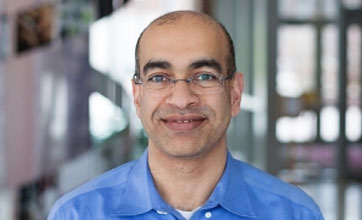Vijay Singh: Fueling the future
Singh has been working with biofuels from the start, long before many others flocked to the technology that could deliver a clean-burning, homegrown alternative to fossil fuels. And while some may argue that the heyday for biofuels has passed, Singh asserts the future remains bright. 
“I know there is a lot of oil that is being discovered in the U.S. and other places, but it is a short term solution,” Singh said. “We cannot rely on oil forever. What happens 500 years from now? We will have to begin to rely on something renewable, because eventually we are going to run out of fossil fuels.”
Singh has devoted to his career to establishing a renewable source of fuel. After earning his M.S. and Ph.D. in agricultural and biological engineering at the University of Illinois, he went on to work as a visiting scientist at the United States Department of Agriculture, where he worked on recovering additional coproducts in ethanol production processes.
One of his goals was to recover corn fiber that contains phytosterols, value-added nutraceuticals which have been shown to reduce cholesterol. Today these natural cholesterol-reducing products are added to margarines, salad dressings, orange juice, and more.
“At that time, we worked on improving corn processing for ethanol production,” Singh said. “As we started to develop new processing techniques, I became more and more interested in bioenergy. Then suddenly the industry took off, and everybody got into ethanol production.”
In 2002, he returned to Illinois to start a research program on corn ethanol production. Today Singh and his lab are developing novel bioprocessing technologies that maximize the recovery of different constituents from biomass and their conversion into higher value products.
As a member of PETROSS, Singh is in charge of figuring how to extract oil for biodiesel production and evaluating its worth. PETROSS plants are engineered to produce 200 times more oil than normal sugarcane and sorghum plants. These plants, with just 2% oil, produce one and a half times more per acre of soybean, and two times more ethanol per acre of corn.
“PETROSS Director Steve Long and his team are putting the genes in the plant to produce the oil, but we are taking that actual final product and pulling the oil out and converting that into biodiesel,” Singh said. “Using all the work we have done on processing, we are further improving our model to predict what would be the cost to produce a gallon of biofuel from PETROSS crops.”
So far, his results show promise that PETROSS is a viable commodity--a key component to meet growing energy demands.
“We will need everything,” Singh said. “I don't think we will be able to get to the same scale with biofuels that we are at right now with fossil fuels. We will need solar power. We will need wind energy. And we will need biofuels in addition to other renewable sources of power.”
By: Claire Benjamin | PETROSS Project
